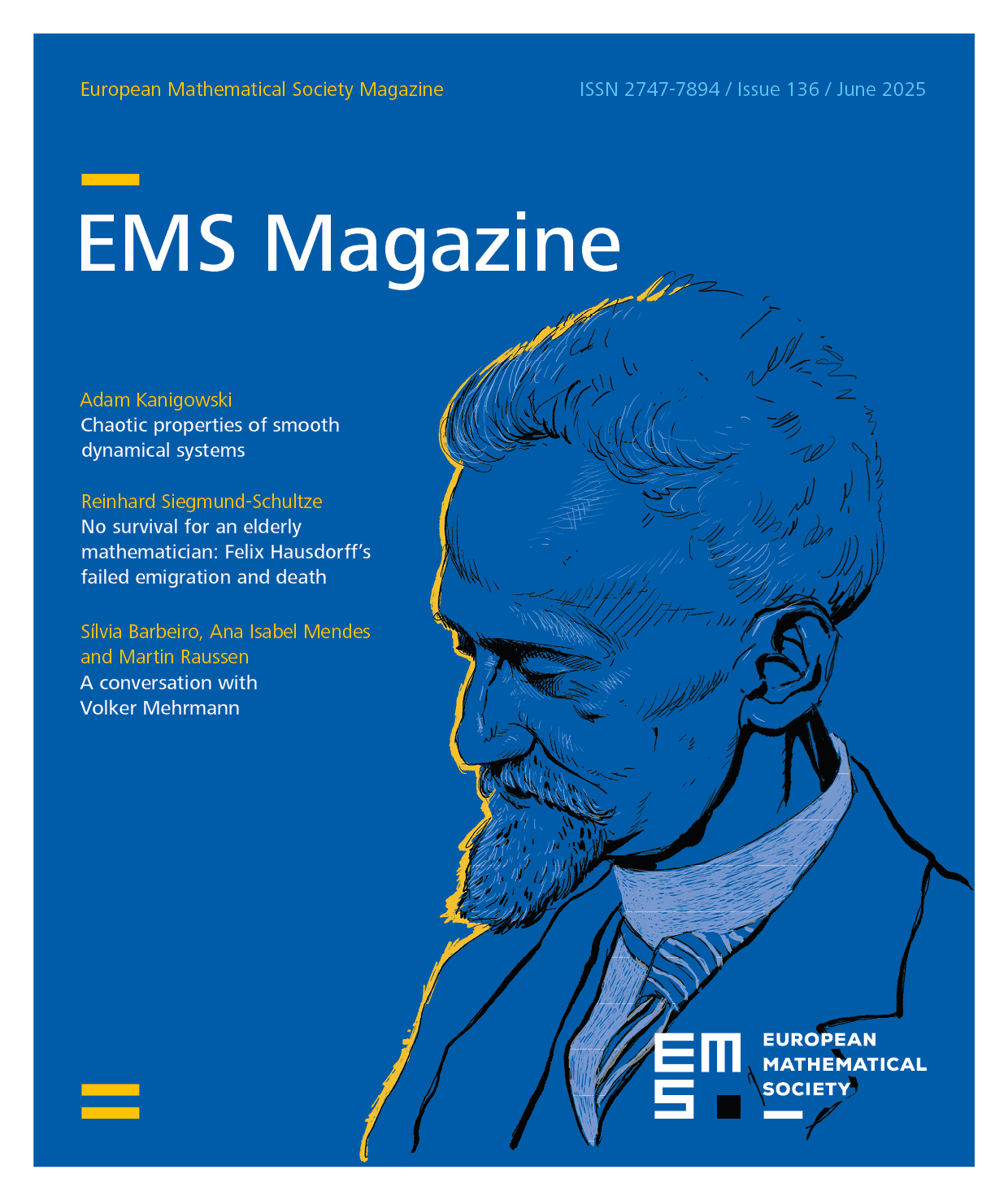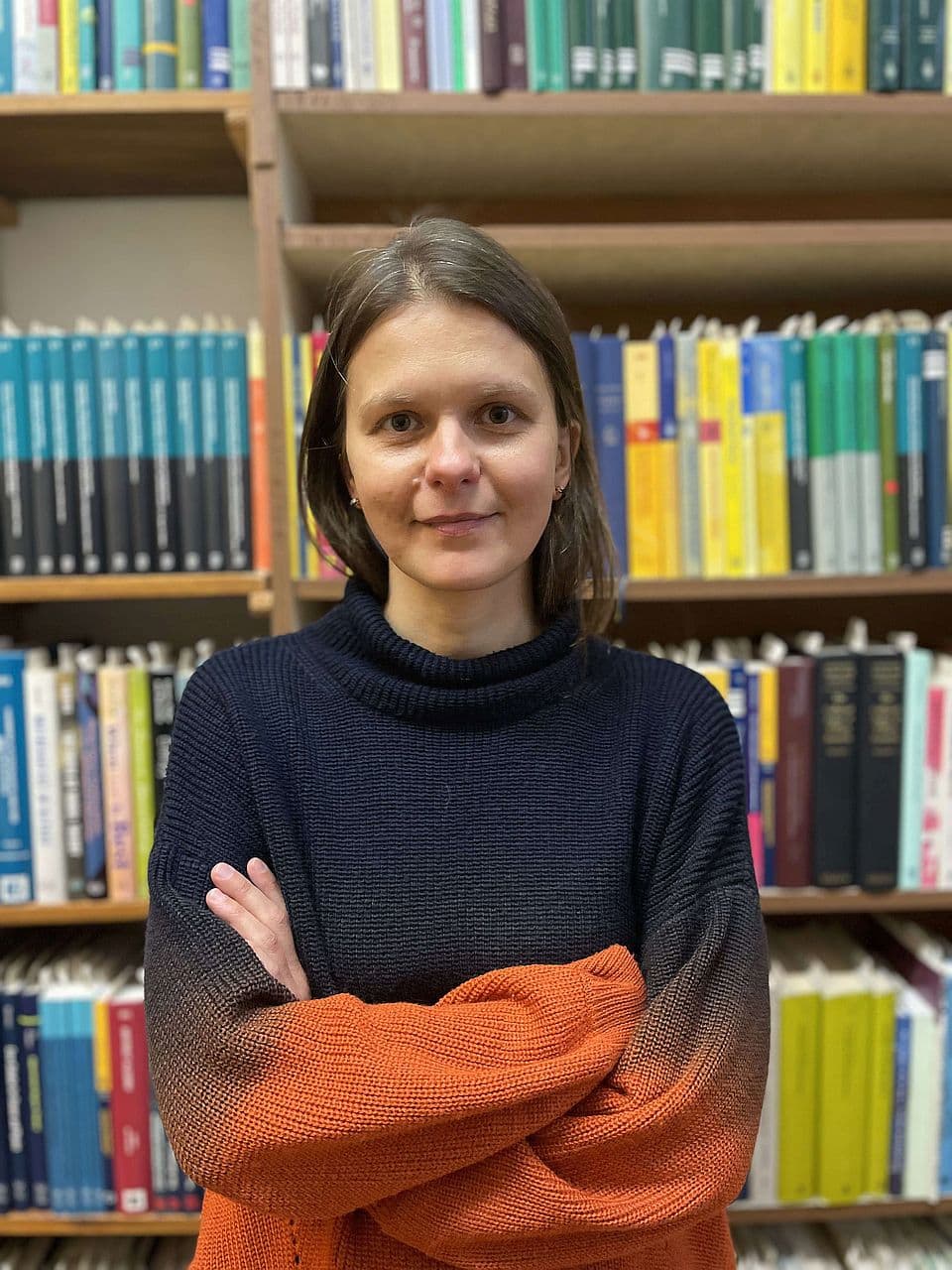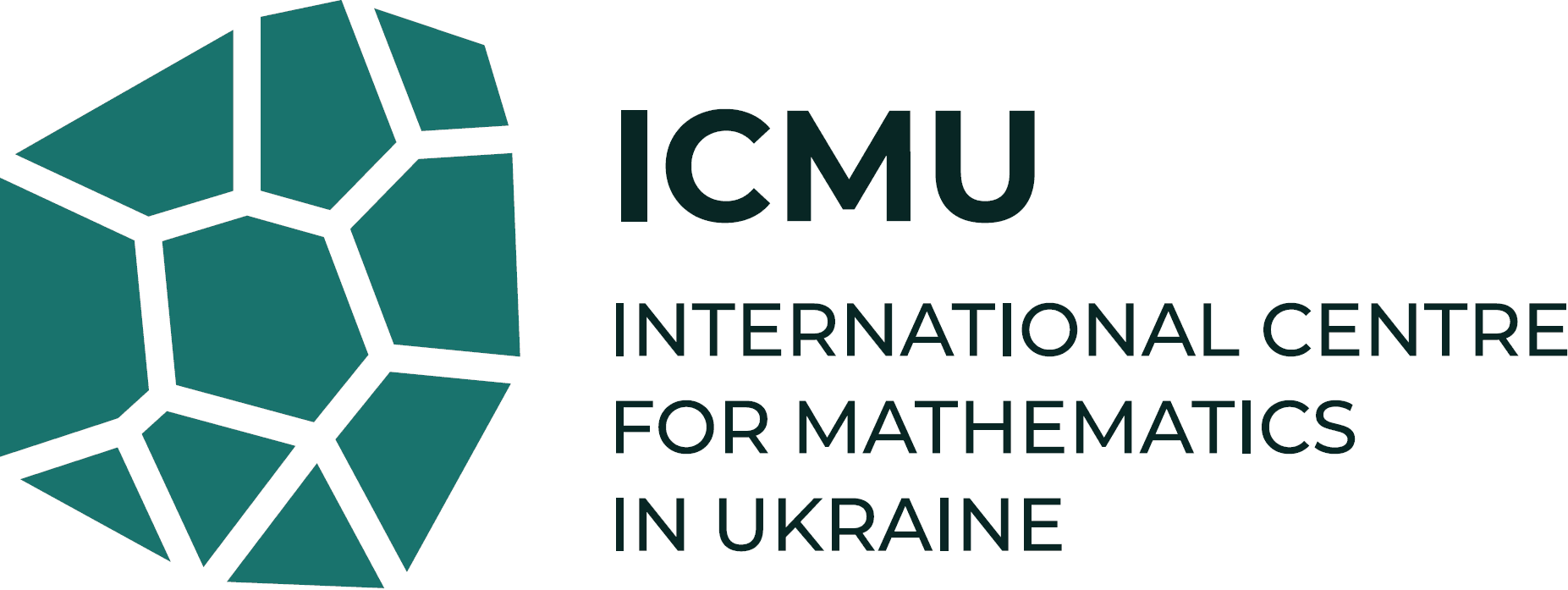For more than three years, Ukraine has been making headlines around the world. A bloody war, incessant bombing of cities, destroyed infrastructure, millions of refugees… And yet, even in the midst of this tragic news, there is a place for science. In 2022 a group of academics initiated an ambitious project – a new centre for mathematical sciences with the mission to support top-level research in mathematics. The position of its scientific director is held by Maryna Viazovska, a 2022 Fields Medal laureate.
How it all began
In the summer of 2022, a team of mathematicians of Ukrainian origin came together with the vision of establishing a “Ukrainian Oberwolfach” – a hub where mathematicians from around the world will gather to train, teach, collaborate, and share ideas.
“I’ve been thinking about the creation of a mathematical centre in Ukraine for a long time, apparently, since I first visited the Max Planck Institute for Mathematics in Bonn. That first visit made a huge impression on me, in particular, the difference between how everything is organised in the Ukrainian academy and there – said Masha Vlasenko, associate professor at the Kyiv School of Economics. – What we ended up with is not exactly what I thought about at the time, but rather the result of the work of a group of people who brought their ideas.”
Discussions on the concept did not last long and the team quickly moved from plans to their implementation – already in autumn 2022 ICMU was officially registered in Ukraine. Soon after, the centre acquired its founding donor, the British algorithmic trading company XTX Markets.
Masha Vlasenko – the main driving force of the project.(Photo by Piotr Achinger, Courtesy of Masha Vlasenko)
©All rights reserved.
In January 2023, Institut des Hautes Études Scientifiques (IHES) at Bures-sur-Yvette hosted the first support meeting of ICMU, which was attended by representatives of European mathematical institutes and several leading figures in mathematics philanthropy. Six Fields medallists (Vladimir Drinfeld, Hugo Duminil-Copin, Peter Scholze, Maryna Viazovska, Cédric Villani, Efim Zelmanov) took part in the event. State authorities were represented by Mykhailo Podolyak (advisor to the Head of the Office of the President of Ukraine) and Claire Giry (director general of research and innovation at the French Ministry of Higher Education and Research).
ICMU officially
The legal status of ICMU is a non-profit organisation. It is run by the Co-ordination Committee consisting of mathematicians who founded ICMU. This Committee is led by Maryna Viazovska (scientific director of ICMU) and Masha Vlasenko (managing director of ICMU). The scientific activities are overseen by the Scientific Board, which involves renowned experts from around the world. The Board makes decisions regarding the selection of the best proposals for organising thematic programmes, schools, and other events. Further implementation lies on the shoulders of the Co-ordination Committee operating on a voluntary basis. ICMU also has a Supervisory Board, whose mission is strategic planning of the centre’s development and attracting funding. It is headed by the distinguished French mathematician Jean-Pierre Bourguignon, president of the European Mathematical Society (1995–1998) and president of the European Research Council (2014–2019).
The logo of ICMU involving Voronoi cells. (Courtesy of ICMU)
©All rights reserved.
ICMU is funded via charitable contributions and grants. In addition to XTX Markets, the centre got a great support from the French government, the London Mathematical Society, the Klaus Tschira Foundation from Germany, the Finnish Society of Sciences and Letters, the Finnish Academy of Science and Letters, and École Polytechnique Fédérale de Lausanne. Many companies and individuals chipped in with smaller donations. For example, Maryna Viazovska donated her “Talents for Ukraine” award from the KSE Foundation; MIT professor Daniel W. Stroock, along with many other mathematicians, also contributed to ICMU.
It is symbolic that a Voronoi diagram was chosen as the centre’s logo. Invented by the Ukrainian mathematician Georgy Voronoi more than 100 years ago, these diagrams are used in various fields of natural sciences, engineering, architecture, humanities and many other fields.
In search of a permanent home
The centre is still looking for a permanent location. Masha Vlasenko: “…Several state authorities are willing to help us [with finding suitable premises]. We are collaborating with the Ministry of Education and Science and the Office of the President of Ukraine. We also received several offers of space from academic institutions. A location in the downtown of Kyiv is considered by our team as the most convenient. We hope to have a home soon.”
In the meantime, the partner institute – Kyiv School of Economics (KSE), kindly provided the centre with a temporary workspace on its campus. KSE also became a temporary home for the centre’s library. Its core is more than two thousands books donated by Springer Publishing House, including the 120 volumes series “Springer Collected Works in Mathematics.” A bunch of books were donated to the new library by Société mathématique de France.
In the World Wide Web the centre set its home at the address https://icmu.ua.
The grand opening: Numbers in the Universe
In August 2023 ICMU organised its first scientific event – the school and conference “Numbers in the Universe.” The event took place in the premises of KSE and the Banach Center in Warsaw, with a live connection between the two audiences. The programme included lecture series by two Fields Medal laureates, Maryna Viazovska and Terence Tao.
Image fig3_Viazovaska.jpg could not be renderedMaryna Viazovska lecturing in Kyiv during “Numbers in the Universe.”(Photo by Gregory Bob, Courtesy of ICMU)
©All rights reserved.
“It was a great event, thanks to which we managed to attract the attention of many people to our project, – said Vlasenko. – In fact, initially we doubted whether the Ukrainian audience would be interested in it.” Indeed, the event was aimed to present the latest breakthroughs in number theory and its applications – a rather exotic topic for the Ukrainian mathematical community. Vlasenko continues: “We assumed that most would come to see the famous mathematicians, but would not go to the other lectures because they would find it difficult. Fortunately for us, the exact opposite happened – it turned out that the Ukrainian audience longed for such an event. A lot of young people stayed after the lectures asking questions and solving exercises until late in the evening.” Jakub Byszewski, professor at the Jagiellonian University in Kraków, came to Kyiv specifically to run problem sessions. Among other brilliant speakers, the event featured lectures of two other Ukrainian mathematicians, Danylo Radchenko and Oleksandr Marynych.
Perhaps the main result of the event was the revealing of the Ukrainian mathematical community to the world. Inspired by the conference, Terence Tao wrote on his blog1Source: https://mathstodon.xyz/@tao/110874054691602461: “The Ukrainian mathematical community was a lot more substantial than I realised, from its eager students all the way to its two Fields medallists (Drinfeld and Viazovska). In retrospect, I think a lot of this strength was historically obscured during the Cold War era due to the conflation ‘Soviet Union == Russia’ that was common in the West.”
Done so far: schools and lecture series
During the first period of its activity, the centre mainly focused on organising various educational events. The first such direction of activity of ICMU concerns summer and winter schools intended for students and young scientists, aimed to involve them in various areas of contemporary mathematics. They are organised in a safe environment in the west of Ukraine (in particular, on resorts in the Carpathian Mountains). These schools are planned as international events – with lecturers from across the world being leading experts in their fields.
Anna Lytova, professor at Opole University in Poland, took part in one of the summer schools. Anna is from Kharkiv, the second-largest Ukrainian city and an established scientific centre, where she got her PhD before moving abroad. She shares her impressions: “The event was absolutely beautiful. Four excellent researchers from America, Canada, Poland, and Hungary introduced students to modern trends in mathematics and made them feel a part of the international mathematical community. We were happy to see so many strong students from different places all over Ukraine gathered together, working on maths, and socialising in a creative atmosphere. Ukraine lacks such events, and these ICMU schools are a big breakthrough.”
Anna was also one of the organisers of the ICMU winter school “Random matrices, random analytic functions, and non-linear PDEs” in Zakarpattia region. She concludes: “I hope in the near future there will be a possibility to organise such events in my beloved Kharkiv.”
Olena Atlasiuk, a postdoc from the University of Helsinki, who took part in that winter school, shares her experience: “Amid the profound darkness of war, the participants and organisers brought to life the joy of connection, the exchange of ideas, new friendships, and positive emotions. Throughout the week, the theory of random matrices was taught to everyone – even the cat, who made occasional appearances during the lectures. Only Ukrainian dumplings and lard could rival the excellence of the mathematical presentations! The experience felt seamless, enriching, and inspiring – a breath of fresh air for all involved.”
Image fig4_ATA.jpg could not be renderedThe participants of the ICMU Summer School “ATA XVI: sub-Riemannian geometry and optimal transport” taking place in Kolochava.(Courtesy of ICMU)
©All rights reserved.
The other educational programme at ICMU comprises a series of online mini-courses designed primarily for Ukrainian undergraduate and graduate students, as well as for very well-prepared high school students. These courses included not only lectures but also practical classes with the need for homework to successfully pass the course.
Many lectures given at the centre’s events were recorded and are now available to a wider audience at its quickly growing YouTube channel.2https://www.youtube.com/@the_ICMU
Done so far: visitors
The focus of ICMU is the attraction of foreign researchers to visit ICMU for an extended period of time. The first distinguished visitor of ICMU was Stephan Klaus, a professor at the University of Mainz and scientific administrator at the Oberwolfach Research Institute for Mathematics (MFO). During his visit in May 2024, he conducted a week-long crash course on algebraic topology.
The restrictions caused by the war make such long term visits challenging, if only because not every university is ready to send its employees on a business trip to a war zone. But, despite all these difficulties, in 2024 ICMU launched two programmes for the external visitors.
The first programme “LMS Distinguished Visiting Fellowships @ICMU” is run jointly by the London Mathematical Society (LMS) and ICMU, and is aimed for established researchers, who can spend a period from one week to one month and give a series of lectures or a colloquium for the benefit of the Ukrainian mathematical community. Alex Iosevich, a world-renowned expert in harmonic analysis, was the first mathematician to visit Ukraine under this scheme. He delivered a series of lectures in Lviv at the Ukrainian Catholic University and Ivan Franko National University, as well as in Kyiv at the working space of ICMU. The other visitors last year were Augusto Gerolin from the University of Ottawa and Francis Brown from the University of Oxford, both visiting ICMU in Kyiv. Every visitor has a Ukrainian hosting scientist.
The second programme “Collaboration @ICMU” resembles the well-known “Research-in-Pairs” programmes existing in many mathematical centres. It aims to bring together a group of researchers from different institutions who wish to organise a short, intensive period of research. The necessary condition – at least one of these researchers should have a Ukrainian affiliation. The ICMU provides a working space and arranges lodging for all involved.
Reception
From the very beginning ICMU got a lot of positive feedback from the worldwide mathematical community. “A lot of people, both Ukrainian and non-Ukrainian mathematicians, started contacting us with good ideas, – speaks enthusiastically Masha Vlasenko. – For example, Borys Kadets from the Hebrew University of Jerusalem, who proposed a series of lectures introducing a wide audience to algebraic geometry. These lectures went extremely successfully, attended by many students, high schoolers and teachers.”
Professor Pavel Exner from the Doppler Institute for Mathematical Physics and Applied Mathematics in Prague, the president of the EMS during the period 2015–2018 and a current member of the centre’s Scientific Board shared his opinion about the project: “When I was asked to join the board of ICMU, I accepted with pleasure, and not only because of my professional relations with Ukrainian mathematicians, some dating more than three decades back. I felt at the same time that it is vital to keep and develop high-level scientific activities in the times when the country faces a military aggression. I am glad that the ICMU project found a wide support and the first two years of its activity were successful; I am convinced the centre will keep this spirit in the years to come, for the good of Ukraine and mathematics.”
It often happens that ideas generated by the diaspora do not find a response among locals. Couldn’t this have happened to ICMU, which was founded (mostly) by those working abroad? Vlasenko responds: “When our team was organised, there was no need to explain to each other what it should be, there was an obvious consensus on what we are up to build. On the other hand, local mathematicians often have no experience of visiting such centres, so the benefit of our project was not obvious at the beginning – there was even some controversy in social networks. However, the people from Ukraine in our team said “You just move. They will see and join.” And at the end of day, this is exactly what happened: for example, the summer school in Kolochava was initiated by mathematicians working in Ukraine.”
Dmitry Shepelsky, the chair of the Department of Differential Equations and Geometry at the B. Verkin Institute for Low Temperature Physics and Engineering of the National Academy of Sciences of Ukraine, a member of ICMU Scientific board, explains the role of the centre: “For students from Kharkiv and other cities where education is conducted exclusively online, the schools established by ICMU provide a rare opportunity for live interaction – both with professors and within a community of fellow students. This is especially relevant for mathematical education, which is currently facing enormous challenges in Kharkiv – a traditional centre of mathematical education and research. Students are reluctant to enrol in such programmes, as they find them difficult, especially when taught online. As a result, the remaining professors are under constant pressure due to the decreasing number of positions. Thus, the centre’s programmes offer at least some sense of ‘normality’ in studying mathematics.”
What’s next?
The main regular activity of the centre will be the holding of thematic programmes lasting from a month to a full semester. Such a thematic programme includes a number of activities such as lecture series by invited guests, weekly seminars, conferences, workshops and science schools to introduce young scientists to the chosen subject. The first call is planned for 2026.
The collaboration programme involves small groups of researchers spending one to two weeks at the centre to work intensively on a specific task. In the future, long-term visiting scholarships for postdoctoral researchers and scientists are also planned.
Another planned activity concerns the translation of modern mathematical textbooks into Ukrainian. ICMU is going to give grants to the translators and organise further editorial and publication processes. Iryna Yehorchenko from the Institute of Mathematics in Kyiv explains its importance for the Ukrainian mathematical community: “There is a generally accepted myth that Soviet mathematical education was brilliant – it is wrong as very few high school students (but only these students were visible) got that good education. This myth persisted into independent Ukraine, and education authorities, as well as publishers, dismissed the need to support popular mathematics and to publish both popular mathematics books and books for students. Less than ten books were published in each category – at a time when Ukrainian book publishing was developing fast. Now it is high time to promote popular mathematics and have good books in Ukrainian, at least for first-year students.”
ICMU also aims to support students in their early steps in science. At the end of 2024, a competition was held to award outstanding student research papers in the mathematical sciences. Such awards are planned to be presented annually.
Speaking with journalists at the grand opening of ICMU, Maryna Viazovska said: “The new centre will serve as a place of intensive collaboration between Ukrainian scientists and their foreign colleagues, a place where aspiring researchers will be learning about the latest mathematical discoveries. While there are reputable mathematics schools and institutions with history in Ukraine, our infrastructure is insufficient. It is essential to provide favourable conditions for professional interaction and exchange of ideas, so that it would be possible to host gatherings with the participation of scientists of different generations, from different countries. Such gatherings are inspiring and there one can learn things one won’t read about in any book or hear about at a university. I believe that knowledge resides in the human heart, and the exchange of knowledge is carried from heart to heart.”
Masha Vlasenko summarises: “What is our activity in wartime? ICMU does everything possible and everything that is good… I would like Ukrainian mathematicians from all over the world to invest in this project – that is what it should be based on.”
Acknowledgements. The author is deeply grateful to Masha Vlasenko for inspiring him to write this text. He also thanks Pavel Exner, Anna Lytova, Olena Atlasiuk, Dmitry Shepelsky and Iryna Yehorchenko for taking the time to share their thoughts on ICMU.
Cite this article
Andrii Khrabustovskyi, Reviving Ukrainian science: International Centre for Mathematics in Ukraine (ICMU). Eur. Math. Soc. Mag. 136 (2025), pp. 39–43
DOI 10.4171/MAG/259

